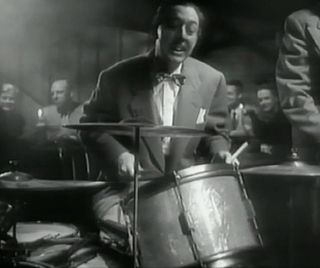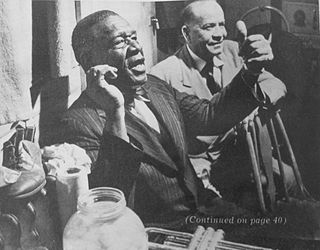This article needs additional citations for verification .(May 2021) (Learn how and when to remove this template message) |
Crescent City Orchestra was a semi-professional symphonic jazz orchestra in New Orleans, United States [1]
This article needs additional citations for verification .(May 2021) (Learn how and when to remove this template message) |
Crescent City Orchestra was a semi-professional symphonic jazz orchestra in New Orleans, United States [1]

Joseph Harry Fowler Connick Jr. is an American singer, pianist, composer, actor, and television host. He has sold over 28 million albums worldwide. Connick is ranked among the top 60 best-selling male artists in the United States by the Recording Industry Association of America, with 16 million in certified sales. He has had seven top 20 US albums, and ten number-one US jazz albums, earning more number-one albums than any other artist in US jazz chart history.
Jazz is a music genre that originated in the African-American communities of New Orleans, Louisiana, United States, in the late 19th and early 20th centuries, with its roots in blues and ragtime. Since the 1920s Jazz Age, it has been recognized as a major form of musical expression in traditional and popular music, linked by the common bonds of African-American and European-American musical parentage. Jazz is characterized by swing and blue notes, complex chords, call and response vocals, polyrhythms and improvisation. Jazz has roots in West African cultural and musical expression, and in African-American music traditions.

The Original Dixieland Jass Band (ODJB) was a Dixieland jazz band that made the first jazz recordings in early 1917. Their "Livery Stable Blues" became the first jazz record ever issued. The group composed and recorded many jazz standards, the most famous being "Tiger Rag". In late 1917 the spelling of the band's name was changed to Original Dixieland Jazz Band.

A big band is a type of musical ensemble of jazz music that usually consists of ten or more musicians with four sections: saxophones, trumpets, trombones, and a rhythm section. Big bands originated during the early 1910s and dominated jazz in the early 1940s when swing was most popular. The term "big band" is also used to describe a genre of music, although this was not the only style of music played by big bands.

Sidney Joseph Bechet was an American jazz saxophonist, clarinetist, and composer. He was one of the first important soloists in jazz, beating trumpeter Louis Armstrong to the recording studio by several months. His erratic temperament hampered his career, and not until the late 1940s did he earn wide acclaim.
Johnny Dodds was an American jazz clarinetist and alto saxophonist based in New Orleans, best known for his recordings under his own name and with bands such as those of Joe "King" Oliver, Jelly Roll Morton, Lovie Austin and Louis Armstrong. Dodds was the older brother of the drummer Warren "Baby" Dodds, one of the first important jazz drummers. They worked together in the New Orleans Bootblacks in 1926. Dodds is an important figure in jazz history. He was the premier clarinetist of his era and, in recognition of his artistic contributions, he was posthumously inducted into the Jazz Hall of Fame. He has been described as "a prime architect in the creation of the Jazz Age."
Swing music is a form of jazz that developed in the United States in the 1930s and 1940s. The name came from the emphasis on the off–beat, or weaker pulse. Swing bands usually featured soloists who would improvise on the melody over the arrangement. The danceable swing style of big bands and bandleaders such as Benny Goodman was the dominant form of American popular music from 1935 to 1946, known as the swing era. The verb "to swing" is also used as a term of praise for playing that has a strong groove or drive. Notable musicians of the swing era include Duke Ellington, Benny Goodman, Count Basie, Cab Calloway, Jimmy Dorsey, Tommy Dorsey, Woody Herman, Harry James, Lionel Hampton, Glenn Miller and Artie Shaw.

The New Orleans Rhythm Kings (NORK) were one of the most influential jazz bands of the early to mid-1920s. The band included New Orleans and Chicago musicians who helped shape Chicago jazz and influenced many younger jazz musicians.
Freddie Keppard was an early jazz cornetist who once held the title of "King" in the New Orleans jazz scene. This title was previously held by Buddy Bolden and succeeded by Joe Oliver.

The Jazz Age was a period in the 1920s and 1930s in which jazz music and dance styles rapidly gained nationwide popularity in the United States. The Jazz Age's cultural repercussions were primarily felt in the United States, the birthplace of jazz. Originating in New Orleans as mainly sourced from culture of the diaspora. Jazz played a significant part in wider cultural changes in this period, and its influence on popular culture continued long afterward. The Jazz Age is often referred to in conjunction with the Roaring Twenties, and in the United States it overlapped in significant cross-cultural ways with the Prohibition Era. The movement was largely affected by the introduction of radios nationwide. During this time, the Jazz Age was intertwined with the developing cultures of young people. The movement also helped start the beginning of the European Jazz movement. American author F. Scott Fitzgerald is widely credited with coining the term, first using it in his 1922 short story collection titled Tales of the Jazz Age.

Wynton Learson Marsalis is an American trumpeter, composer, teacher, and artistic director of Jazz at Lincoln Center. He has promoted classical and jazz music, often to young audiences. Marsalis has won at least nine Grammy Awards, and his Blood on the Fields was the first jazz composition to win the Pulitzer Prize for Music. He is the only musician to win a Grammy Award in jazz and classical during the same year.

Donald Harrison Jr. is a jazz saxophonist from New Orleans, Louisiana. He is married to Mary Alicė Spears-Harrison and the father of Victoria Harrison.

Ray Bauduc was a jazz drummer best known for his work with the Bob Crosby Orchestra and their band-within-a-band, the Bobcats, between 1935 and 1942. He is also known for his shared composition of "Big Noise from Winnetka," a jazz standard.

Oscar Phillip Celestin better known by stage name Papa Celestin was an American jazz trumpeter and bandleader.

Irvin Mayfield Jr. is an American trumpeter, composer, bandleader and educator.
Orchestral jazz is a jazz genre that developed in New York City in the 1920s. Early innovators of the genre, such as Fletcher Henderson and Duke Ellington, include some of the most highly regarded musicians, composers, and arrangers in all of jazz history. The fusion of jazz's rhythmic and instrumental characteristics with the scale and structure of an orchestra, made orchestral jazz distinct from the musical genres that preceded its emergence. Its development contributed both to the popularization of jazz, as well as the critical legitimization of jazz as an art form.
Sidney Desvigne was an American jazz trumpeter.

The period from the end of the First World War until the start of the Depression in 1929 is known as the "Jazz Age". Jazz had become popular music in America, although older generations considered the music immoral and threatening to cultural values. Dances such as the Charleston and the Black Bottom were very popular during the period, and jazz bands typically consisted of seven to twelve musicians. Important orchestras in New York were led by Fletcher Henderson, Paul Whiteman and Duke Ellington. Many New Orleans jazzmen had moved to Chicago during the late 1910s in search of employment; among others, the New Orleans Rhythm Kings, King Oliver's Creole Jazz Band and Jelly Roll Morton recorded in the city. However, Chicago's importance as a center of jazz music started to diminish toward the end of the 1920s in favor of New York.

Dee Dee's Feathers is a 2015 studio album by American jazz singer Dee Dee Bridgewater recorded together with trumpeter Irvin Mayfield and the eighteen-piece New Orleans Jazz Orchestra. The album was released on 14 August 2015 via OKeh and Masterworks labels.